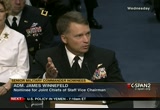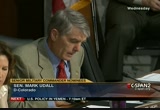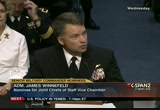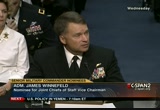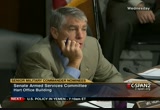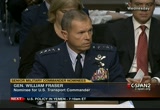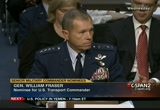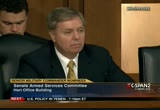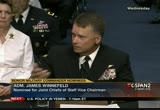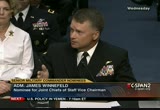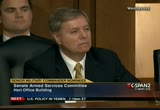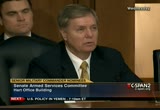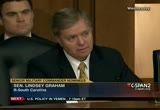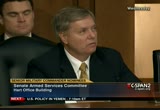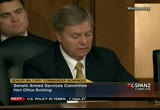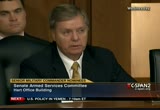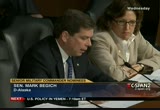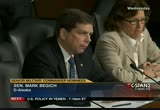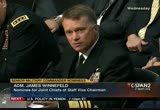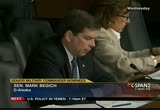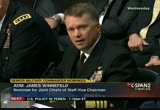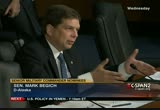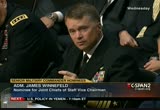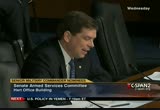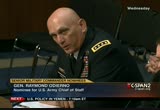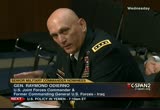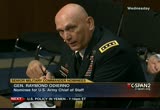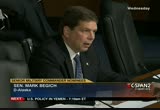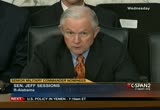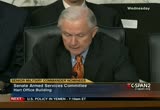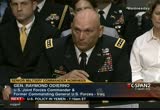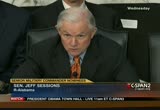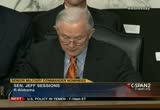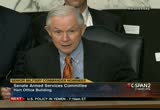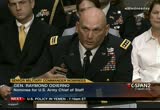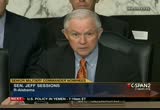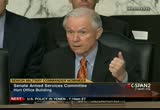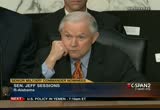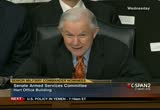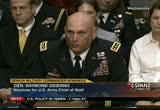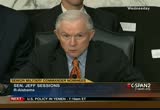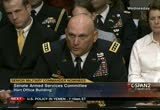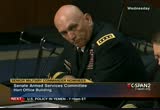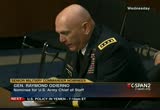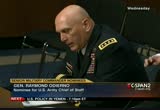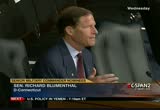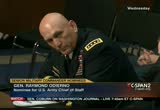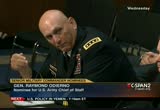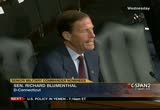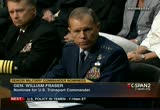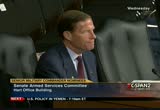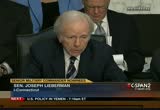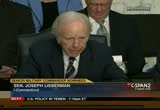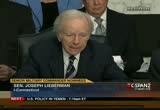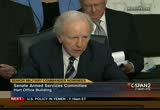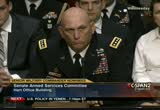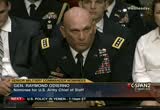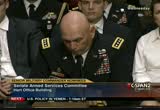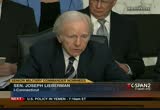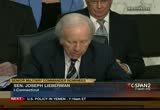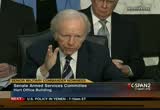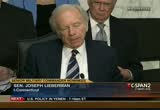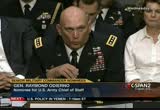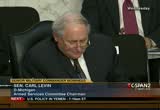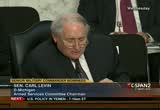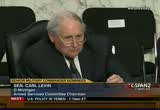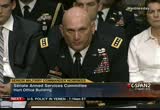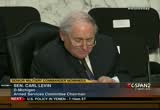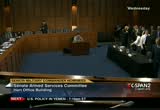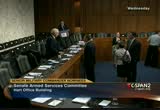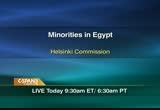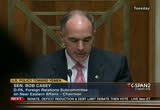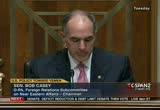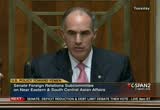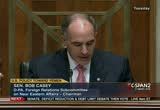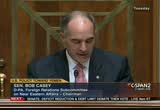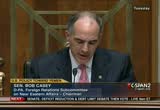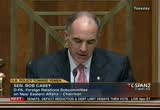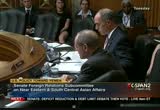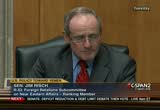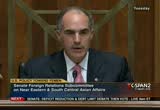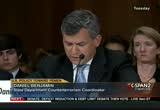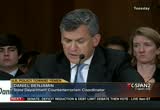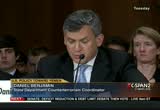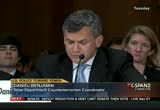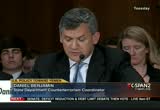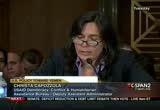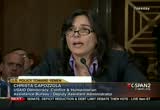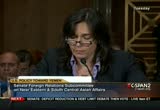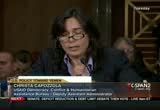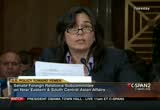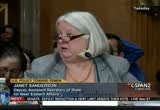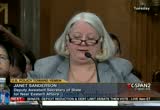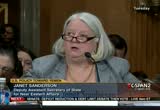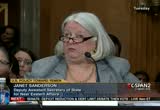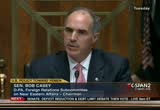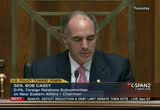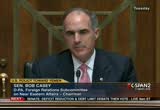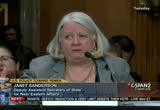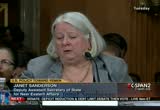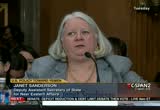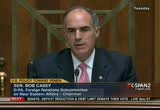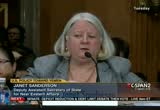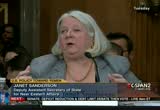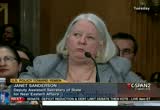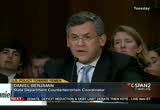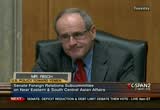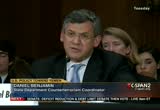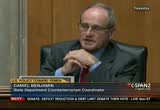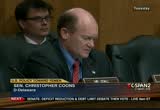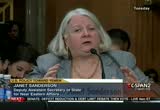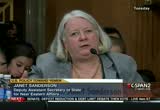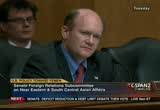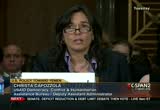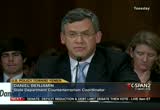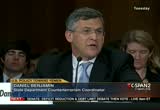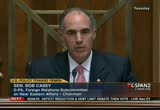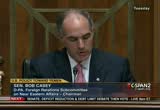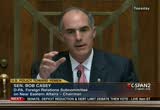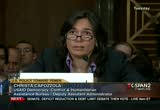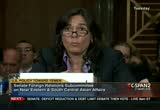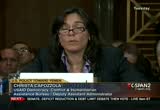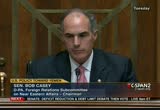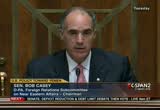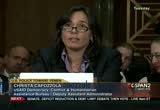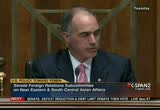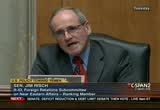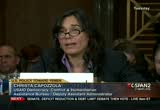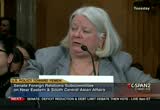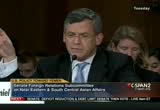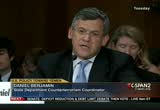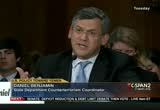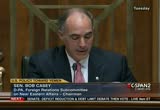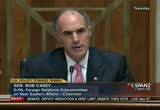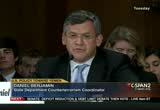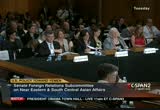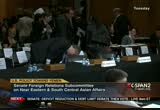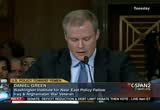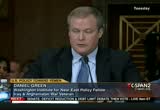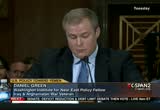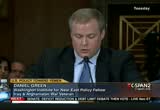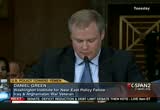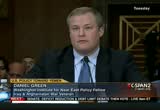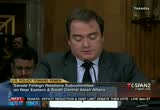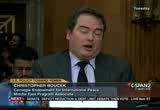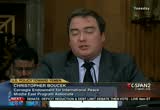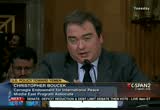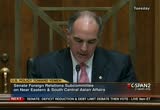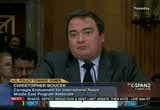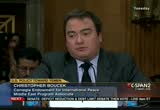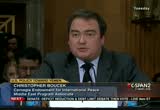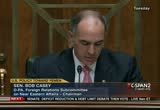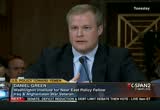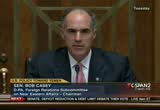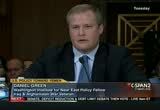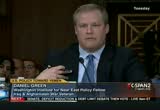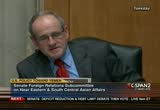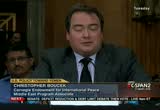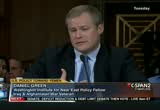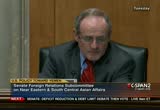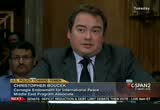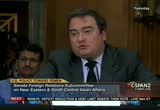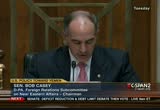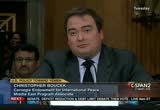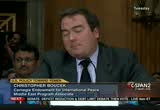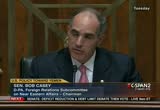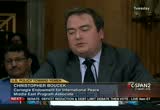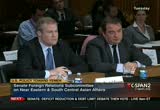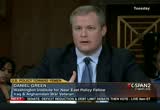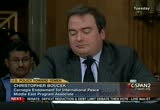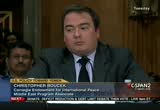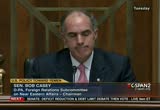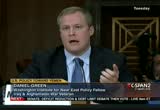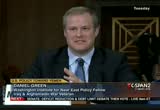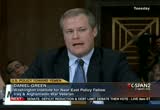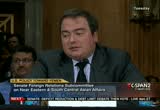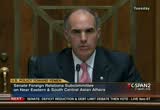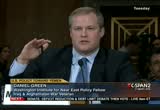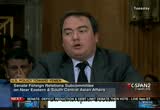tv Today in Washington CSPAN July 22, 2011 6:00am-9:00am EDT
6:59 am
7:00 am
with the what the iranians are doing. i think if they don't stop, our credibility with them and a lot of others in the region, if not the world, is going to go down if we don't do something about it. i can appreciate your statement and i'm encouraged by the others. none of us want to have more conflict, but we are not asking for it by our behavior in this case. they clearly are. i've thank this review. i look forward to working with you. i would say that, if i may paraphrase an old political slogan, the great thing to say is that not only are the three you extraordinary that you are as extraordinary as the people you are leaving. in other words, this is a bottom-up high quality of military. to me it's the one institution in a country that i always say look at it when people tell me that america's best days are
7:01 am
behind us. i wish i could say they should look at the united states congress. i can't quite say that at this moment but they can look at the military, and i think you for the. thank you, mr. chairman. >> i share your thoughts and comments. just a couple quick questions. one, general odierno, about iraq. what is -- you've indicated you would support retain some u.s. forces in iraq beyond the december 31 deadline. if there's a request. how much longer does iraq have to make a request for us to consider? >> well, everyday makes it more difficult because it's not only us, i know general austin has built a lot of flex builder in his plan for the final withdrawal of our troops, but he has to do some planning. but more importantly is going to
7:02 am
have to be some work done on some sort of a status of forces agreement between our two countries. so it has to be done soon, because it could take a little bit of time i can give you a specific date, chairman, but i would have to say it would be the sooner the better for us to make this an appropriate transition. >> you said something before which i think you didn't exactly mean but let me prove you are. you said provide iraq with the support they think is necessary. i assume it would be a joint decision, knowing what they think is necessary but we are willing to provide. >> we have done a joint assessment where we identified gaps in the capabilities, and that's been done jointly and driven by us. so it's not just what they think. it's a joint assessment. >> no, general, relative -- now general, you indicated very strong feelings about the importance of doing that,
7:03 am
because of the requirements we place on them, and your work among other things. we have in the army main battle tank, a tank which is going to remain in the inventory, it is, coast and still in production of an upgrade version vehicle 2013 the active army now has the version of the tank and most of the car has the m-1a version. here's the issue. the army is going to begin the next abrams up grade modernization effort in 2016. they will end the production of
7:04 am
the upgraded in 2013 as it now stands. so there'll be a three year gap between production of the upgraded and the next upgrade, but we know there's going to be an upgrade program. that's a given as i understand it. and so the army has initiated a comprehensive cost-benefit and risk analysis of the impact of that gap in production on our armored vehicle production facility which is in ohio and supporting industrial base. the final results of the analysis are expected at the end of year so we will not have the results of the analysis until the end of the year. in considering the costs of closing and restarting the production line, which we know is going to be restarted, should we not consider the increased capability in the national guard tank units which would result
7:05 am
from continuing this production during this gap? >> certainly, senator, we will take a look at it. the problem we have is while several other factors have been impacted on this. it has to do with budget reductions in force structure reductions and the next that we decide we need in the force. so could be that we decide that potentially a number of heavy units reduced and we're able to push more into m1a2 out of the active component. that could be one solution. so we have to wait, part of this progress waiting to see what we will have to do with our force mix and force structure as would think about this problem. i understand the issue. we will look at it very carefully and we will work with you on this issue. >> there is a question as to whether or not it pays us to terminate and the cost to restart, and whether those costs are not better -- >> i am not completely to my with all the details of that but
7:06 am
i will certainly get back to you. >> thank you. this is for admiral winnefeld, do you think this should be operationally effective and cost effective and should be tested in an operationally realistic matter before deployment? >> yes, sir i do. we are also as you know in a simultaneous training test and development phase. >> finally, admiral, you have experienced as the combatant commander responsible for the operation -- the ground-based midcourse defense system that currently provides protection of the homeland against the threat of limited missile attack from nations like north korea and iran. you also have experience working in a cooperative manner with russian military officials. and if we could work out something in a cooperative manner with russia, missile
7:07 am
defense, that would enhance our security against common missile threats from iran. would you agree? >> yes, sir, absolutely. >> gentlemen, the nation is in your debt. we are in debt to your families. we thank you profusely. we will do this confirmation, as just speedily as we can given the u.s. senate. you never know for sure but i think all of us are pretty darn confident that will happen very, very quickly. thank you. we will stand adjourned. >> [inaudible conversations] [inaudible conversations] [inaudible conversations]
7:08 am
7:09 am
7:11 am
>> now a look at u.s. counterterrorism efforts in yemen, which has been slowed by the political unrest in that country. this senate foreign relations subcommittee hearing is an hour and 50 minutes. pennsylvania senator bob casey is the chairman. >> the hearing will come to order. i will start with an opening statement, and then we will of course introduce our witnesses, and then we may have other statements as well. but i want to thank f1 for being here. we're getting started just after right time. and we are here today for it very important purpose. we're here today to discuss the complex health challenges facing the united states policy in
7:12 am
yemen, and that examination of policy comes amid five months of popular protests and political unrest. during this historic period of sweeping change in countries like egypt, tunisia and syria, yemen often gets overlooked. however, as result of the power vacuum caused by president saleh's departure to saudi arabia in june, there are serious concerns over the government's ability to prevent al qaeda from gaining a foothold, or i should say a stronghold, in the country. as was brought up concerns about the growing humanitarian and economic crises that are plaguing yemen today. al qaeda's presence in yemen is not new. we know that, it has grown increasingly worrisome the past couple years. al qaeda in the arabian peninsula as we know by the aqap
7:13 am
has acquired, i should say has carried out multiple attacks against the people of yemen. and also against americans as well as other countries and her citizens. we all remember the foiled christmas day so-called underwear bomber attack and 2009, which revealed aqap's strategy of direct attacks on the united states homeland. october of last year gemini terrorist again targeted the united states homeland with ups packages containing explosives, one of the packages was bound for the philadelphia international airport, in my home state of pennsylvania. given the direct threat that aqap poses to the united states national ticket interests, and taking into account significant gains made in u.s. operations and against al qaeda in afghanistan and pakistan over the past year, counterterrorism efforts in yemen must be a
7:14 am
central focus of our national security strategy. that said, our -- closely in line with political, economic and developmental challenges as well. those challenges are those that the united states must work to address as part of a holistic approach to this challenge. first of all, just outlined three. three priorities. first, we need a better understanding of the political opposition and prospects for democratic reform. acting president, the vice president in yemen, as only a small power base in the opposition appears fractured between the so-called joint meeting parties, jmp. and other individuals such as the former commander of the first armored division and check
7:15 am
out omar, leader of the powerful fellow. over the weekend elements of the opposition asked the formation of a shadow government to the composition and support, i should say though the -- for those the composition and support for the group remains unclear. it is clear however that the transition process will take place sooner or later. the president has committed to eventually stepping down from which resulted in new leadership for yemen the first time in 33 years. but the united states needs to be prepared for this post solly government, whatever that might be. we don't know the contours of that it. second priority, of the three elements and indistinct we must be prepared to address the rapidly deteriorating humanitarian crisis, the violence between pro-saleh
7:16 am
forces and opposition demonstrates has only exacerbated already chronically poor conditions in the country itself. with the average citizen survives on less than $2 a day. a third of yemen's population is under nourishment and the country is facing a severe water shortage. it also faces as well of food and fuel crisis at the same time. education indicators are among the lowest in the middle east. only 32%, 32% of girls are attending secondary school. the united states needs to send a message of solidarity with the people of yemen. and part of that message we need to send as we are concerned about their well being and their prospects for the future. while the united states will not be able to solve the daunting development and economic challenges facing yemen, we can
7:17 am
help mitigate their impact throughout development and humanitarian assistance. third and final point. the u.s. and our international partners should develop a long-term strategy on conflict resolution in yemen. in a country rife with tribal conflict, most recently and notably the rebellion in the north and secessionist movement in the south, al qaeda has found a safe haven. this is a clear example of how our counterterrorism strategy must have a something component. usaid has done good work to committee outreach programs aimed at fighting extremism among young people. this is just the tip of the iceberg. saudi arabia has a unique role to play given its strong ties to the yemeni people, and security interests. we must think strategically about how best to leverage our collective resources to achieve
7:18 am
a sustainable development policy. as we turn to our witnesses, it's important to emphasize that yemen cannot be viewed through a single lens. in a country where fast political security, humanitarian and development challenges continually converge, the u.s. must endeavor to formulate a coordinated short term and long-term policy taste on their core national security interest. so i commend our diplomats, and i will want to commend in particular gary fierstein and deputy chief administer richard who worked continuously and increasingly difficult and violent. i look for during more about how the u.s. can better examine and address the threats posed our national security, and ultimately to better meet the legitimate needs of the yemeni people. now turn to our ranking member, senator risch. >> chairman casey, thank you so much for scheduling this thing.
7:19 am
it's really appropriate that we do focuses on yemen at this particular time. with the arab spring in many changes that are accompanying the middle east, it's really important that we do focus on yemen, which is becoming increasingly more important to u.s. policy in the middle east. as we all know, yemen lies in a strategic crossroad between the arabian peninsula and the horn of africa. it has seen a flow of extremism and terrorists cross back and forth and recent victories of a cut in the arabian peninsula in southern sudan, should be troubling and it's troubling for u.s. policymakers. since the department of defense is pursuing counterterrorism policies, which indeed have demonstrated some success, but we've been focused very much on the capital in the outlying areas of yemen need more
7:20 am
attention. we need a more comprehensive strategy that coordinates the activities of state department, the department of defense. there are immediate challenges but we must also make sure we are not making longer-term issues in the country worse. the dangers of human breaking apart and becoming even more of lawless landscape will have serious repercussions on long-term interests of the united states and the region. another safe haven for pirates, potential for attacks like the uss cole, and other threats endanger u.s. personnel in the region. i hope we can quickly develop a broader strategy because the consequences for the region could be severe if we don't. i welcome this hearing today in order to hear from our witnesses and their thoughts on solutions and moving forward. thank you very much, mr. chairman.
7:21 am
>> thank you, senator risch. i'll introduce our witnesses and we'll go right to the testimony. our first panel, i will limit the introduction for for spam and will do the second panel when we reach that point, we'll hear from the honorable janet sanderson, deputy assistant secretary of state for near eastern affairs. the honorable daniel benjamin, courtney for catechism at the department of state, and ms. christa capozzola, deputy assistant administrator in the bureau for democracy, conflict and humanitarian assistance at usaid. for purposes of movement from left to right, ambassador benjamin will go. i think we'll start with you. >> chairman casey, ranking member risch, thank you very much for inviting me to appear before you today. as you will hear in a few moments from my colleague, ambassador sanderson, the
7:22 am
situation in yemen in terms of politics and economics is quite tenuous. the presence of al qaeda in the arabian peninsula, aqap, means that this volatile situation has a direct bearing on our national security. as we see with both the 2009 christmas day bumped in and the cargo bomb attends one year later, in the fall 2010, aqap is developed not just a decide but the capability to launch strikes against the u.s. at home. as a result of the last several months of political unrest, government of yemen's effort against aqap has suffered a setback when it caught most of its security forces back from the provinces including its counterterrorism units. where most of them remain today. aqap took advantage of the power vacuum to expand its operational territory, particularly in the south which historically has resisted rule from the north and the capital. aqap has made territorial gains,
7:23 am
specifically attacking the capital city. is potentially threatens the port city gives aqap access to international ceilings. our two-pronged strategy recognizes that yemen to long-term stability addressing the factors that lead to instability by promoting good governance, rule of law, and human and economic development. however, not to promote those long-term goals we must tell the government confront the immediate security threat represented by al qaeda. counterterrorism strategy strives to build the capabilities of human security forces to effectively combat aqap and other terrorist elements, and also to reduce the appeal of aqap to potential recruits. in 2010 the united states provide an estimated $179.8 billion in training and assistance to yemen ski counterterrorism and related law enforcement units.
7:24 am
specifically third funny, dude yes help build the capacity of yemen's military forces to conduct training programs to yemen special operation forces, yemen coast guard, border security forces and the yemeni air force. however, no fy 2011 funding has been program for yemen unfortunately because of the security situation and political unrest. antiterrorism assistance training is provided to the ministry of interior's criminal investigative division, and should essential security organization. and focus on building investigative capabilities of the police and the secret forces to detect, disrupt and respond to terrorist threats. program object is also including improving, strength in response in developing the ability to detect dangerous devices upon entry at land, air and maritime borders. however, i can do to the
7:25 am
security situation aga trading was suspended in february and we plan to resume it when the situation improves. we also provide training and equipment and assistance to build the capacity of the criminal justice sector. in addition to security assistance we are gearing up some important efforts in the area of violent extremism. with the department of defense weather project this to assess radicalization at the provincial level to develop tailored approaches to counter violent extremism including viable alternatives for at risk youth. encouraging local credible voices to challenge to aqap message. to develop a better essay of aqap messaging and audiences, the state department characters and strategic a mutation center is commissioned to research and analysis project that will outlying aqap narrative
7:26 am
including how these narratives a line with our conflict with specific audiences. this by the challenge posed by the local situation our counterterrorism cooperation continues as we share common interest for the yemeni government in fighting terrorism and defeating aqap. it is important to underscore that our counterterrorism partnership goes beyond one individual. and based on our conversation with a broad cross-section of yemenis we are confident it will continue once a political resolution is achieved. i want to thank you very much again for inviting me to testify before this committee on this very important subject, and i look forward to your questions. >> thank you very much. ms. capozzola? >> mr. chairman, and mr. ricci member, thank you for your invitation to testify before you today on yemen. the challenges and constraints to securities, stability and economic development for the yemeni people are growing. the current political crisis and
7:27 am
led economic impacts on foreign exchange, on imports and on food and fuel access are increasing the number of vulnerable people countrywide. at the same time, the increasing political violence has displaced an additional 70,000 or so people from their homes since february. adding to the already large humanitarian situation in the country. usaid's program partners are responding to these conditions under difficult circumstances. the strategy and portfolio were designed with sufficient flexibility to do with evolving condition but the overarching goal of the strategy remains, to help build a solid foundation and the overall resilience and stability to enable yemen to meet its development challenges longer-term. and mitigate the drivers of extremism. the agency is doing this by focusing on two priorities, first, community led activities to improve livelihoods for vulnerable population and
7:28 am
especially youth. these activities include cash for work, typically for community infrastructure improvements, like health services and safe drinking water access. also includes support for small farmers, access to improve irrigation. linked to this community-based effort is of course also usaid's maternal and child health program, including for example, 1500 midwives train just in the past year to improve women's access to health services around the country. plus also of course the range of unity based youth engagement and vocational training activities, that we are supporting around the country. secondary of emphasis and probably, the democracy in government area, helping to improve governance capacity and strengthening the role of civil society in yemen. so ultimately human can achieve more inclusive and effective --
7:29 am
can achieve more inclusive and effective institutions that are able to respond to yemen citizens and mitigate conflict. so, how are we pivoting to meet these new challenges? first let me say that although the u.s. mission is under order to parker, the usaid mission is still staffed at three down from five. usaid in 20 partners are facing increasing security constraints and the pace of implementation in certain programs has slowed. but we continue to operate throughout the country. where we see new and security challenges plush miniature requirements such as in the south, access is a restraint to monitoring conditions in responding to needs, but usaid's key partners are operational in delivering humanitarian aid to those in need. further, usaid is closely
7:30 am
coordinating with international organization partners and other bilateral donors to prepare for worsening food and humanitarian condition. by identifying needs and pre-positioning relief. in the areas of greatest concern. we are also courting with our international partners to prepare for a potential transition. usaid co-led a recent assessment of expected electoral process needs in the near future. in addition to contingency planning we're taking action under this rapidly evolving conditions. usaid is expanding its geographic scope to include urban areas were recent unrest paralyzed more basic services, and increase the number of vulnerable people. we are continuing summer programs for over 14,000 youth in five governance based on a successful pilot of youth engagement that was it done last year. the agency is providing for example, medical supplies and
7:31 am
pharmaceuticals to health facilities that are treating the wounded in cities that are facing extended violent protests. yemen is facing immense challenges, at the same time local and global in nature. and it is in support of vital u.s. national interests to continue to provide development assistance to yemen. thank you, and i look forward to your question. >> thanks very much. ambassador sanderson. >> thank you, mr. chairman. chairman casey, ranking member risch, distinguished them as of the committee, let me first joined with my colleagues to thank you for inviting us before you today. we appreciate the committees interest and to our nation's priorities and goals in the region. we are pleased to present the committee with an overview of the administration's policy and our relationship with yemen. as you rightly note, mr. chairman, civil unrest in the middle east and north africa in the past six months has focused
7:32 am
its attention on governments across the region the human is confronting a myriad of political economic social security and governance challenges and the current clinical crisis has exacerbated systemic issues such as unemployment, a rapidly growing population, a week state institution, decline in government revenues, growing natural resource scarcity and, of course, violent extremism. consistent with u.s. national interest, we have adopted a two-pronged strategy for yemen. helping the government confront the immediate security threat represented by al qaeda, and mitigating serious political economic and governance issues that the country faces over the long terms. the drivers of instability. the united states continues its regular engagement with the government, including with president ali abdullah saleh who is currently as you know recovering in saudi arabia from his injuries following a june 3 attack on his compound, the acting president, vice president
7:33 am
hadi, the opposition civil side i activists and others interested in yemen's future. we strongly support the gulf cooperation initiatives which we believe would lead to a peaceful and orderly political transiti transition. the gcc initiative signed by both the ruling general people's congress party and the opposition coalition joint meeting parties. only presents ali is blocking the movement going forward and we continue to call on him to sign the initiative. the situation on the ground remains extremely fluid. but the solution will come and must come from the yemeni people. with the assistance and support of their international partners, namely the gcc and saudi arabia. conditions continue to deter it under the pressure of growing protests and increasing divisions throughout the country. widespread inflation including rising commodity prices, decreasing liquidity and the threat of a food shortage this
7:34 am
summer foreshadow an economic crisis in the coming months. while most protests in yemen have been peaceful over the last couple of months, there have been violent clashes between pro-and anti-government demonstrators, and wasting protesters and government security forces and, to break up demonstration that the united states has strongly urged the me government to investigate and prosecute all acts of violence against protesters. ultimately, mr. chairman the goal of the u.s. and international efforts is stable, secure prosperous, and effectively governed yemen. this demands a deep and ongoing coordination with the yemeni government and the international partners. we will be able to more effectively engage in yemen once the yemeni government initiates the political transition and identifies its way forward. thank you, mr. chairman for inviting us to testify before your committee today, and thank you so much on behalf of of
7:35 am
ambassador firestone and his colleagues for your very kind words. they certain they deserve it. my colleagues and i are very happy not to take your questions. thank you. >> thank you very much. etd, thank you for staying within your time limits, even without being warned about time. we are grateful. let me just provide kind of a setting for my questions, and then i will start with ambassador sanderson. when you go through the list of challenges that we face, and, of course, the people of yemen face directly, what is the basic security challenge, because of the threat posed by al qaeda, not to mention other security issues, the poverty issue, health care, and you go down the list, i'm not sure there's a place in the world that has more. then when you juxtapose that with the unusual circumstances as compared to even other
7:36 am
countries in the region, a lot of other places where that is for for for change, you have some kind of transition process, place the elements of a transition. there was a leader of one kind or another, a group of leaders where you could have a transition. here we have very little of that. and, of course, we've got a president who's not physically physically there but also has kind of given mixed, in my judgment, a lot of mixed signals to us in the world. so there's a lot of, to say there's volatility and uncertainty is an understatement. in the context of all that, all of those challenges plus the unusual dynamic which i just outlined, i probably haven't done justice to, we get the news that there's a 17 member council, which some have described as kind of a shadow
7:37 am
government of technocrats, that will ultimately select 501 members of a national assembly. and yet according to one published report, i guess it was "the new york times" that says that many of the members of the council were not informed that they were named to the council. so you had even more uncertainty and a lot of questions about whether or not just day-to-day governance can take place, which, of course, exacerbates the security and other problems. can you tell us anything about that in terms of any current information about this recent news about the council and anything you can tell us that's an update on the president, what his intentions are, what we believe his intentions are, just the kind of basic day-to-day who's in charge and kind of fundamental governance questions?
7:38 am
>> well, thank you, mr. chairman. let me try if i can. you've covered a wide, wide group of topics it and i think they do point to the enormous challenges that the yemenis face, not only today but also in the longer-term. with regard to the president, as i stated in my testimony, he is indeed still in saudi arabia recovering. we have seen reports from people close to him that he is interested in turning the sanaa big we are not able to confirm that one way or another but obviously whatever he does lose large in the political calculations of everyone on the ground in yemen right now. we strongly believe that a transition is necessary, that an orderly peaceful transition is the only way to begin to lead yemen out of the crisis that it has been in for the last few months. we are strongly supportive as i said of the gcc initiative. we believe this is one way within the framework of the
7:39 am
existing yemeni constitution that not only leads to elections, but also allows the opposition, the public, the protesters, also have the police in yemen's future. so we continue to strongly urge president saleh to sign and implement the agreement. in terms of the governance of yemen, the acting president under the terms of constitution is the vice president, hadi. he is a southerner who has been rather retiring in the past. he appears to be willing to sort of step up to the plate and begin to make the hard decisions that a president, even in income or acted president of yemen must be. he has been meeting with opposition. he has been meeting with members of his own party. he has been meeting with protesters and he's been meeting with the military to try and come to some type of agreement to continue and, indeed, enhance a political dialogue is going to be so important for human. obviously, what the in game
7:40 am
looks like in terms of who will lead yemen into the future, that's still very much up in the air. we do hope in the end of these consultations, we hope that the president will sign the gcc agreement. we hope that, therefore, that would allow a national unity government to come forward, and again move toward elections as i said within a period of 60 days. we have seen these reports that say that some of the protesters have established a national council. frankly, we don't have a lot of information about it yet. there's no provision for such a council within the terms of the constitution. our understanding from ambassador feierstein and others that there were people name to the council who are caught unawares and were not expected to be so named. it seems to us that at this point is council doesn't have a lot of traction, but the political environment in sanaa
7:41 am
remains quite fluid so i think we'll have to see how it plays out. i get back to my original point. we believe that political dialogue is essential to unravel this set of knives that the yemeni clinical process finds itself in. we believe that saleh's role in that will be critical, but we also think that an open political dialogue between the parties, the opposition, the protesters, the use, and certainty civil society is going to be very important for the future. >> i want to ask before i turn to senator risch, as you know from eye opening, i believe we should be sending a very clear message to the people of yemen that we're focused on their concerns as well. and sometimes as it happens, sometimes just by implication or maybe my emphasis we focus
7:42 am
appropriately on counterterrorism, but sometimes that can in some ways downgrade or deemphasize our focus on the people. i guess i would ask on behalf of the ministration, what would you say if you had a room full of citizens of yemen here, what would you say to them in terms of our focus and our message to them beyond the common focus that we have on al qaeda and other extremist? >> well, i think that's an actual question, and i do want to stress the fact that we see are partnership with yemen far beyond the prison of counterterrorism cooperation. obviously, that's important but we have brought relations in terms of our assistance relationship, our public diplomacy outreach, our support for civil society. we are working very closely with the yemeni people on priorities that are important to them. they face as you noted in homeless economic challenges
7:43 am
that frankly are tried in the country, i'm afraid, inky immediate crisis. but we understand that our relationship is simply not a security or a military relationship. that has to be broader, fuller and it must bring to bear all the resources of the u.s. government so we can support them as they go through what is going to be an extraordinarily difficult transition for them. >> and i will turn to senator risch but i might ask you later about kind of results that our taxpayers can see and by way of measuring. senator risch. >> can you describe force the situation down in the southwest where the militants seem to be in charge and al qaeda is influence in that regard? >> senator, what we've seen as a result of this focus by the government on the security situation, the political unrest in the large cities is a growing
7:44 am
space in which extremists have been able to operate. there are reports that an islamic militants among them include some members of al qaeda have gone in and taken control of the city of zanzibar. a couple smaller cities in that area have also been taken over by militants. we do know that the revolutionary guard into zanzibar garrison is under siege and has not been relieved although the government is trying to find a way to do that in the very near future. it speaks to our concern about control of the central authority over various parts of the country, even the vice president himself has admitted that the government does not have control in five of the 21 governance. but we are concerned about obviously is with this focus on the political malaise with a focus on the political unrest, that the very real threat to
7:45 am
human, to us, to the people of the region come from al qaeda and from extremists is going unaddressed. one of the reasons why we encourage president saleh and the various players to come to some type of agreement to get the political dialogue started and get a solution under way. but yes, we are quite concerned about the situation in the southwest. >> mr. benjamin, do you have anything to add to that? >> senator, it is of course a matter of great concern that al qaeda in the arabian peninsula seize this opportunity to establish a territorial hold on this area, and zanzibar and others. it is something that we are watching with great concern. we are worried, obviously when heavy safer haven for opera can we are worried that they
7:46 am
threaten cities. and, of course, if they're able to get access to the sea, that presents other concerns him and i just want to echo what ambassador sanderson said. it is vitally important that the transition take place, and that the security forces in yemen get back to business, that we be able to resume the full range of training activities that we have with them so that they can deal with this issue. and under governed space since are not new to human. this is been a problem for not just years but decades, but the situation is quite worrisome and that is really why it is so important that the political stalemate be broken. >> one of the reasons i ask this is, you mentioned the money that the u.s. was spending in arming and training the security
7:47 am
forces. and we've learned the hard way that sometimes the people that we are arming and training to become our adversaries in the future your guy don't need to go into specific examples of that. we all know. is that a concern here? >> i don't think it's really a paramount concern right now. the militants who are active in the south are not people that we have armed or trained before in any way. and we don't expect that there would be many individuals who would defect from the armed forces and join with this group of militants. what we are occasionally concerned about is that the weaponry and the training that we give take your forces are used for the reason they were giving him and we've maintained a very scrupulous in juice marketing. our monitoring is somewhat affected by the fact that the
7:48 am
situation, security situation is not what we would like him and, therefore, our ability to investigate is limited. but i don't think that we have to worry right now about yemen killed in the other way. and i would just want to underscore another part of my statement which is we do believe that there is a strong desire on the part of yemen needs across most of the political spectrum to cooperate with us and deal with the terrorist threat within yemen's orders, and the sound is that the embassy has taken in the opposition, for example, have been quite clear about th that. and our counterterrorism cooperation is surely not just about one person, one particular leadership group. is very much about helping the people of yemen deal with this pernicious presence within the yemeni state. >> i appreciate that.
7:49 am
that was the reason i ask the question, is if you look at that, it certain seems to me at least that there is some risk that this blossoms out and envelops the whole country, where they are as weak as they are, where the gum is as weak as it is in the people really ineffective and being able to govern themselves. your words are comforting. i hope that's the situation and continues to be the situation. thank you. >> thank you, senator risch. senator coons. >> i want to thank senator casey probably this quickly important hearing on u.s. policy in yemen. i am deeply concerned as are other members of the committee of the yemen given the presence of al qaeda in the arabian peninsula. and recent clinical of people and other instability, the panel has described. i may be? in my view the united states has to maintain the resources and flexibility to respond to other emergency 30 threats such as
7:50 am
those in iran and somalia and specifically human. i am concerned our commitment in afghanistan is limited the resources available for addressing such threats. and i wanted to start asking about deeply the united states has dedicated the resources really necessary for addressing emerging security threats and other development related sources of instability in yemen, and i'd be interested in an overview from all three of the panel members about what you think we are providing the needed both capital and political in developmental resources to deal with the challenges in yemen. >> thank you center. i had to say that there's been a significant increase, as you are aware in our assistance, both from the civilian and military side since 2009 to yemen. we have i think a holistic approach to our policy towards yemen. them when and where working hard to try and address the issue of
7:51 am
terrorism, to address the issue of extremism, to provide the training and equipment to the yemenis so they can deal with this very important issue. on the other hand, we understand that we have to focus on development, governance, social issues, the types of things that do create the conditions in which extremism can flourish. so i have to say that from our perspective of the state department, we have the tools we need at least at this point to do the necessary in yemen. to be honest in yemen we are somewhat hamstrung by the capacity of the yemenis themselves. there is not a large capacity to take on either large amounts of development assistance. there's a very weak civil society although i have to say it's going to on the military side we very much focused on the cd elements that are going to be partners with us in the effort against violent extremism. but we have been tried like is a
7:52 am
very great in the tools that were bringing to bear, then married robins that yemen faces. whether it is through the typical traditional aid programs that christa can talk about, or the middle east partnership initiative where we have a very robust program in yemen that addresses things like political party developments and civic education, as well as things like trial bribes. i think we have the tools we need to address issues on the ground. i have to, however, flag the fact that when there is this transition, this political transition, the needs of the yemeni people i think are going to become much greater. and the international community of which the united states is a leading player is going to have to step up and help the yemenis in this new political environment and move forward. >> thank you. >> thank you.
7:53 am
to reiterate what my colleague has said, our resources, were stepped up last year in fiscal year 2010 quite significant. in terms of development and humanitarian assistance, they more than doubled compared to fiscal year 2009. so, we are really stepping up our game and using, as was said, a variety of creative mechanisms to extend our reach throughout the country, it into more communities, more areas, more community level investments, the kinds of things we can do in this environment where we may not have the type of partnership we need at the central level to tackle some of the fundamental development challenges, for example, water. so we're doing a lot of local level water with these resources. and i think sending a very
7:54 am
strong message to the yemeni people about u.s. support for their situation. on the other hand, we can't address the longer-term water challenges that yemen faces right now until attention can be turned to in the center on key policies and engagement with a broader international community to bring the kind of investment together that will tackle those sorts of challenges. >> thank you. and ambassador benjamin, if i might add to the question of whether we that sufficient resources we have partnered with the saudi to some extent it would've urged in terms of our policy and our approach. i'd be interested in hearing your comment on both. [inaudible] >> first on the resources, let me just elaborate on what's been said before and say that the primary constraint on making progress in yemen right now is that the numbers, it's the political situation that inhibits our ability to spin
7:55 am
effectively, and just to give you one indicated set of numbers, our 2006 funding went from 4.3 million in 2006, to one and 53 million in 2010. that's an extraordinary lead. yet we are unable to spend money this year because of political insecurity. so i think we have the right mix of resources come and i should also add that from the characters and perspective, i'm particularly please have a strong commitment that the administration has to invest on the development side and governance side because of that five important for dealing with the fundamental underlying causes that drive extremism. the real issue will be when we can get back to work there. you asked about the relationship with saudi arabia. we consult with the saudis every
7:56 am
step of the way. they obviously are the most influential power in the region, and yemen's neighbor to the north. i think that we have actually a very clear understanding of the requirements their your they share our desire to see resolution of the clinical situation, and to get on with helping yemenis solve their security problems and deal with very, very formidable long-term economic development, governance problems that they face. >> thank you ambassador. thank you, senator. >> thank you, senator coons. i wanted to start this round with ms. capozzola. with regard to, not just the dollar amounts and what is being spent for, but what results you are seeing. and i can't even begin to describe, maybe you could if you
7:57 am
had a lot of time with the challenges you face and usaid is always facing difficult environments but this has to be one of the most difficult, where you have not just a tremendous need with the rise in violence and other complicating factors, it's harder to deliver on what we propose or promise or fund. but i was just going to your testimony, just kind of highlighting some of the things you mentioned as progress, or in terms of either progress or just and initiatives. i'm looking at page two of your testimony way you describe some of the challenges in the number of internally displaced persons, 50,000-60,000 help your providing there. clean water, emergency relief, humanitarian programs, you
7:58 am
highlight health care services, agricultural inputs. them page three you actually list some of, in a more specific way, some of the work that is being done. seven, water projects, water and sanitation for 15,900 beneficiaries, and five other districts. rehabilitation of roads. mobile medical teams, 1500 midwives. what's the best way, let me ask you to question. what's the best way to articulate results from all of that effort, say, over the last year or two? number one, what's the best way to articulate the results? and then number two, can you provide us with any vignettes or examples or testimony that would make the linkage between poverty
7:59 am
and economic devastation, or desperation maybe, that you are seeing leading directly to extremism or terrorist activity, or at least the inspiration for that? because we say that in a way where we i guess believe it is self-evident, that if someone is poor and desperate and hungry, they may turn to extremism. but i wanted to ask you, because you may be seeing things on the ground that are more evident, or more powerful of an example of how those conditions lead to extremism. but first the question on kind of results for our dollars and our taxpayers. >> thank you for the excellent questions, senator. i think there really is a key question. we talk about our objectives in terms of mitigating the causes
8:00 am
of instability. you have a very broad portfolio with a lot of activities around the country, and what is it all adding up to in terms of impact? this is, this is a key question. at the first level, i think usaid's activities are fully engaging with the yemeni people. and to your earlier question about the message that we're sending, i think, on the first level very important to look at the outputs and the engagement of our work in terms of the number of youth that we reach and provide training services and development activities to, the number of women who get improved access to health care. ..
8:01 am
8:02 am
mitigate conflict. for example in a few different areas in the north there's a lot of conflict between tribes created by access to water for farming and programs doing simple repairs to irrigation canals have been neglected for many years are having a documented impact on these communities and how they are able to prevent conflict over water access. we see a lot of examples like that at the local level. our ultimate goal is to see that at up to a bigger impact as a whole. >> when you see the second question in a moment i want to press you a little on the first part, the first question. we are living in an environment fiscally and in terms of our
8:03 am
budget where taxpayers need to see results. they don't expect results in two months but over a year and in some cases two years wanting to make the comparison. some of what you have here are results. when you say there are 1,500 midwives strange -- trained, you can extrapolate how many pregnant women are helped or get an estimate. improved access to water and sanitation for 15,000 beneficiaries, that as a result you can measure. in order for this to work, to sustain support for strategies that have these kinds of positive outcomes we have to be able to list, itemize, measure. i know that is difficult but i urge you to try to provide those. i am almost of time.
8:04 am
let me add more time to my question period by this linkage or perceived linkage between poverty, desperation and extremism. can you give us any insight or evidence? >> i think it has been documented in a number of analyses there's a strong link between economic opportunity and attraction to extremism. in a number of different settings. i don't have an assessment at this time of our yemen youth activities to lookit the analysis. i will look into it and see if i can find a specific project level, community level story for
8:05 am
you because it is a great question. the work we are doing just this summer reaching over 13,000 youth around the country is important. the work we're doing in four different vocational training centers providing small business and entrepreneurial skills to youth. in the civil society side of the portfolio we are engaging to support emerging youth leaders. this is very important working closely with the embassy on those activities. these are all -- there are a lot of interim results we can point to about the types of impacts we are having on people's wives and continue to make that presentation as strongly as we
8:06 am
can. >> back to ambassador benjamin in a moment but senator risch? >> we need to get to the next panel. miss capozzola, something of interest to me and a lot of others up here is can you give us your assessment of how americans are held in regard in yemen? i ask that question because a lot of us are relatively concerned and offended to a degree to how poorly we are held in repute in pakistan. we went in and spend hundreds of millions of dollars rebuilding their bridges after the floods and put in billions of dollars every year and they have objective measurements that show the favorability of americans in a single digits in pakistan. that is pretty disgusting when you spend that kind of money and trying to help people and get no
8:07 am
appreciation. i understand there is no objective standard in yemen because probably impossible to measure on an objective basis. from anecdotal testimony or some subjective standpoint can you give me your description? >> thank you for that question. in general perception of americans are positive. the way i can help illustrate that most poignantly is we brand our assistance in most cases throughout the country. it is ted. it is clear who is coming from. this is important terms of the messageing also means we are able to operate many u.s. aid
8:08 am
partners openly as funded by the american people. this is well-received. it is done for the most part safely throughout the country. >> what would be your gut feeling if they did some objective standard, did an objective surge day. what percentage of people in the country would respond that they were favorable or at least neutral as far as the united states is concerned? >> i really can't speculate. i may turn to my colleague to see if there have been any surveys done. i am not familiar with the data on perceptions that may have been done. any recent experience? >> i have seen some q reports and others that have done surveys in the region but i am not aware of anything on yemen
8:09 am
specific. i can only share anecdotal evidence in terms of our embassy out reach. until the most recent security problems the embassy was really moving outside to make sure there was a sense that it was more than just a focus on the capital which is one of the things we are often accused of no matter where we are. the reception the ambassador and embassy colleagues have received has been extremely good. in terms of specific information we can look into that and see if there have been more recent polls but i have nothing to share with you. >> a couple follow-ups. ambassador benjamin, anything to add on the linkage between poverty or desperation? >> i would like to address that. i would like to say to senator
8:10 am
risch that we know from pockets of polling that the united states is much more popular in yemen and pakistan. i am sure there is more data i can get you. last year national defense university hosted a large group of yemeni officials from civil society. i met with them two or three times. many officials met with them. desire to engage with the united states is very powerful. there's a deep desire to work together and deal with yemen's problems. we have strong partners there once there enabled by the political situation who want to cooperate with us to address some of yemen's pressing challenges. senator casey, and the issue of poverty and radicalism is important that the research indicates there's not a direct link between poverty and
8:11 am
radicalization. poverty is often used by those who incite others to become radical in an instrumental fashion to illustrate their position in the world is poor and it is for because there are pressed by others so they should be more radical. our findings that are particularly relevant to yemen and to step back if you look across the range of the terrorist operatives who have been wrapped up and arrested over the years an awful lot of people who have never known real poverty but who in fact because they enjoyed some comfort in life have the leisure to develop radical ideas if you will. nonetheless it is important to go at the fundamental socio-economic problems as well because one of the key drivers of radicalization is poor governance and failure of government to provide fundamental social goods and
8:12 am
services. this comes out in conversation again and again with yemenis. their frustration they don't have adequate water and sanitation and any number of different kinds -- those things we take for granted and consider fundamentals of modern life. that is why the development aspect of our policy is so important. not just to lift people out of poverty which is an important goal in its own right but also because there is a sense they are partaking of the modern world as part of -- on = footing with others is vitally important. and corruption and poor governance are key drivers of radicalization. >> let me highlight one part of your testimony and ask one quick question. on page 2 you say that -- glad you have this in your testimony
8:13 am
-- united states strongly urged and publicly called for the yemeni government to investigate and prosecute all acts of violence against protesters. you don't have to comment on that but i am commending you for putting that in. the point you make, so many you can make about the security situation. we don't have nearly enough time but you say our counter-terrorism strategy focuses on building the capabilities of yemen security forces to counter al qaeda effectively. you addressed this to a certain extent but what can you tell us about that? when our taxpayers see our efforts and our dollars and asked about results earlier, they want to be able to say we are getting results here and the yemeni security forces can do this on their own at some point. what progress report or indication can you give about
8:14 am
how we are doing on that score? >> the view from the administration particularly from dod which is doing the lion's share of training but state department through anti-terrorism training is doing a good deal as well that the yemenis are improving their capacity. they are making good progress towards being able to deal with threats within their borders but it is important to recognize our engagement in yemen was interrupted for many years. yemen did not have the kind of mentoring programs and training programs many of our other counter-terrorism partners had. it was when the obama administration came into office
8:15 am
a review was done beginning in march of 2009. it was recognized that yemen was a major challenge in the world of counter-terrorism and it was not until december after many conversations with the yemenis that we felt they were on board with the project and their first actions against aqap, this was shortly before the assented bombing of the northwest flight. this is the ministry of interior that is civilian units that making good progress but obviously have a lot to learn. vitally important we get back to training these units so they can take on the mission they need to. >> we are out of time and i am sure members will have a question for the record that you can answer in that way. we wish we had more time but we
8:16 am
are grateful for the testimony and the public service work each of you do. we will move to our second panel. thank you very much. [inaudible conversations] >> as we are transitioning, i will indicate our second panel has two individuals testifying. the actor christopher boucek, middle east research associate at the carnegie endowment for national peace and mr. daniel green, from the washington institute on neither east peace
8:17 am
-- near east policy who will testify. we will ask each of our witnesses to provide an opening statement. the first panel stayed well within their time limits which we try to be roughly within the five minute timeframe as is true of the first panel. not sure i said this for the record but their testimony will be made part of the record as will each of our two panelists on the second panel. so your full testimony will be made part of the record. if you could provide a five minute summary we will have a period of questions. mr green, we can start with you. thank you for being here. >> chairman casey and members of the committee, thank you for letting me speak with you about the challenges our country faces in yemen. since the outbreak of protests against the continued rule of
8:18 am
yemen's president there has been a significant increase in yemen and the arabian peninsula. much of this has to do with the fact that many security personnel are preoccupied with regime survival or regime change or protecting protesters. most notably the u.s. trained battling members of the hashi and reports that president sa a sallah has removed his personnel to precipitate a security crisis and prompted u.s. to support him as the only solution to the problem with al qaeda. the security situation where al qaeda is located is deteriorated rapidly. of the last few months aqap's targeted assassinations and kidnappings have become more sophisticated. on march 27th as you know
8:19 am
alleged aqap members seized a munitions factory. this was followed by a may 2019 operation were 200 alleged aqap members overran the capital of in southern yemen which is east of the major city of pagan -- d --aid --aiden. the military is attempting to retake the city. on june 22nd several dozen alleged al qaeda prisoners escaped from a prison in the port city of omulkullah. this has enhanced aqap's ability to mount attacks against the u.s. homeland and our interests. conflict in the capital will affect yemen's future course but efforts to control the problems affect u.s. national security interests. the key battle with aqap is in the countryside. the u.s. government needs to pay more attention to this problem and craft a suitable strategy. as part of this effort to washington institute for near east policy is conducting a
8:20 am
series of studies whether al qaeda is operated. the u.s. approach must be decentralized, locally based, long-term and holistic blending military and civil approaches. this is an impediment to expanded u.s. presence in the countryside. the president in saudi arabia and yemen's political action in a stalemate now is the time to offer a sign of expanded aid package to help the government stabilize the problems. we should adopt a forward strategy consisting of four main components. these are more about how we are organized in yemen rather than how many resources we are devoted to a problem. the u.s. needs a robust for an internal defense program. washington should consider an expanded training initiative for yemen security services concentrating on counter-terrorism and conventional forces. u.s. trainers should deploy to the problemss. government forces would benefit
8:21 am
from u.s. training and equipment as they confront aqap in the countryside. washington's understanding of provincial dynamics would improve considerably. the u.s. needs a foreign internal governance strategy to complement for an internal defense strategy. with security initiative underway the united states should evaluate practical aspect of decentralizing governance moving some of them from the capitol to the countryside to partnership with provincial governors or other officials including tribal leaders. this might be facilitated by a conflict presence in central or eastern yemen though i realize that is a significant political gesture. the decentralized approach would bolster local governments and mitigate underlying grievances aqap exploits to increase support. the u.s. needs to leverage the human terrain more effectively to defeat al qaeda. the united states should consider an effort to map yemen after rain to get a better understanding of local communities. the state department of the
8:22 am
united states for international development and the u.s. military should extend the course of u.s. personnel serving in yemen to facilitate deeper understanding of a local situation. within this framework the united states should develop a yemen and initiative similar to the afghan hands initiative where u.s. personnel were in the country for a number of years. these approaches with help the continuity problems from constant personnel rotation and finally the u.s. should appoint a special envoy to supplement the work of our u.s. ambassador in yemen to assist in regional diplomacy to promote stability in yemen and ensure the issue aqap continues to receive the attention it requires. this person would require a needed alternative to -- often prompted yemenis to be skeptical of u.s. intentions. the envoy can't address the ongoing relationship between aqap and islamist militants and craft a strategy to confront both. i look forward to answering any
8:23 am
questions you have. >> dr. boucek? >> chairman casey, members of the subcommittee, i would like to thank you for the opportunity to discuss a critical issue for the united states's policy towards yemen. i would like to say i think it is important to keep in mind there is very much we don't know about what is going on in yemen right now. it is difficult to get accurate information about what is happening and more difficult to travel. it is very fluid and changing surge nation as was noted in the first panel. it is also important to note initial fears of violence, how bad things could really go have not come to pass. there have been some episodes of severe violence but it has not devolved into the civil war we
8:24 am
are talking about five or six months ago. things could go wrong very quickly. this goes to the importance why we are here to speak about yemen. yemen's problems are very well known. they were gone over at length in the first panel but it bears keeping in mind the family economy is the heart of everything going wrong in the country. we have rampant poverty, grinding poverty, unemployment at 35% on par with the great depression. in actuality probably much higher than that. a whole host of government abuses, resource depletion and one of the highest growth rates anywhere in the world. all that said it is challenging we talk about u.s. policy because we want to avoid state failure or state collapse but no
8:25 am
one can tell you how that might happen. for policymakers it is difficult -- you can't imagine or thing for what the causes may be. if there are no easy options there are no easy policy solutions. if there were we would have come up with them by now. it is important that we look at yemen with some realism about what we can accomplish and what we can't. at an end of the day the united states has little leverage to influence events in yemen but we tend to alleviate how bad things will be. by making progress, the whole spectrum of yemen's challenge we can give the yemeni government more space to breathe and alleviate the humanitarian impact of how bad this will be. much of american policy is focused on counterterrorism and despite efforts of our
8:26 am
government, the perception in yemen is counter-terrorism that al qaeda is what the united states cares about. there that need for a robust counter-terrorism program and a number of things we can look at that we probably should look at and corruption and access to water are two of the most important issues to focus on that affect every yemeni. this will improve the situation. security and stability will come when conditions improve for everyone. we need to make sure our policy is geared toward the public of yemen and not the government. that is an important message we need to maintain and we need to focus our assistance programs not only on areas we are concerned about, al qaeda or radicalization. that sends a message that is the only reason we are interested in yemen. i go through a number of points but i want to spend the few minutes i have left talking
8:27 am
about the economy in saudi arabia. i really think after this political crisis ends one way or another the economy will dwarf the current problem. the problems overwhelming. yemen is not a failed economy but is on its way. food prices, fuel prices, all skyrocketed and this is the country with the most vulnerable population in the region. it is important to stress there's not one saudi policy toward yemen or on just about anything. i think the saudis are trying to figure this out as many others are but security and stability are the key issue they are concerned about. with that i look forward to your questions. thank you for the opportunity to be here. >> both panels did a good job on time. you set a good example.
8:28 am
i want to -- not by way of competition or a challenge between panel 1 and peddle ii but when you outline the two challenges you highlight two that you spoke to in your testimony. corruption and access to water. when you hear usaid's testimony, you examine and consider other evidence on the record how do you assess u.s. efforts on those two anti-corruption measures and strategies to help on basic needs. >> the efforts to improve irrigation canals need to be commended but there's a lot more we can and should be doing.
8:29 am
80% of violence in yemen is about people fighting over access to water or the land that controls water. we're looking at tv coverage, media coverage it is all about al qaeda and violence. we could do more in this area helping with rain collection and programs to deliver the message about how you use water and what it has to do with security and stability. there's a huge area we can do more about. terrible to think when it rained in the capital there are children that guy. is running out of water. we can do more to help them collect water. traditional methods of irrigation. on corruption i don't think we can do too much on any of these issues. we can probably do more. these are the issues that not
8:30 am
only affect every yemeni but our sources of future violence and instability. >> when you look at those priorities you outlined and you set that next to the efforts we are undertaking in dollars and in terms of the number of strategies, are we trying to do too many things or should we concentrate on these priorities? what is your sense on the way we are prioritizing and being successful in the results we get? >> my perception is american policies -- counter-terrorism and al qaeda and everything else after that and i think we understand why the reasons for that are but i don't think we are doing enough to focus on these other issues. we have a very immediate near-term look at this problem
8:31 am
and it will take years to deal with but if you look at the central problem is how you improve the relationship between the government and the people. how to build capacity and the government to be more responsive and how do you build the belief in the people to think their government is not working against them and that is not a fast solving problem. any place you have receiving state authorities this is an issue and it will be an issue going forward in yemen. ..
8:32 am
>> similar to what we are undertaking in afghanistan. then fourthly, the appointment of a special envoy. when you make these recommendations, are you saying that we are not currently undertaking any of them? or do you see some of them as an expansion of what we are doing? or as i was saying before, more of a focused approach? >> sir, i served in iraq and afghanistan. i served it year, and you see again and again the state department, usaid, having difficulties adjusting to the challenge of a warfare. when i start working on yemen it's a very familiar situation to me although it's not a xerox of afghanistan. it is focused on working with local partners that may or may not work in areas where we are mostly concerned with.
8:33 am
it's overly centralized. it's a very focused on process and sort of the factions that are in the national capital. if i could tell you -- i can't think what the political opposition is in the province where the -- in addition to serving that which is going on in sanaa. we don't have a good understanding of human terrain. just not in afghanistan were mapping the human terrain. and it iraq the it almost happened by accident. they have the anbar awakening. our sensitivity to these nonstate types of identities is very not particularly well-developed. and i think most of our human terrain is probably focused on the counterterrorism mission, but not about the human trade, the leverage, showing we have the sensitivity, the interest of the people. >> you mention in your testimony a number of times about the effort, you think we should undertake in the countryside. how do you best describe that?
8:34 am
i realize sometimes we make efforts in another country that is focused on capital or the urban area. can you describe what you mean by that? and why it's a particular concern in yemen? >> yes, sir. going back to iraq and afghanistan we always seem to have to relearn some of these lessons, so much of the situation in the countryside affects our interest, and our ability to influence that is often through national level programs or national implementing partners. for one reason or another don't go out to areas that are too dangerous or are not considered strategic. same problem in yemen. unfortunately, no one wants to send anyone in harm's way, but its same time no one wants to see al qaeda have a successful attack. somewhere between those two, left and right parameters, there's got to be something we can do that can put folks into these areas to show the americans faith isn't just
8:35 am
counterterrorism strikes. >> is there a model you can point to in iraq or afghanistan, or efforts anywhere, where you think we can draw a lot of good inspiration that's not capital or embassy centric, but it's more kind of local and countryside a major? >> i worked at a provincial reconstruction team in afghanistan for a year. that is limited but there's also a district support team which are three-person elements in afghanistan. but in yemen with something called civil military support elements which are interesting innovation. the people who principally man i believe are the military but they wear civilian clothes. a lot of what they're doing is we're doing that humanity work in human terrain mapping. it's a very small program. and unclassified program. i think that's the way we might be able to address some of these problems. my preference would be state
8:36 am
department and aig people, but our force protection concerns are so great. no one wants to lose an american life i message him. you can have a policy, holistic long-term strategy in an industry that is on order to parker. i understand the need -- i do have the responsibly of government share but we have a lot of lessons were learned in iraq and afghanistan. shouldn't be chronically forgetting some elements of those. >> but you said in yemen now we have kind of a foundation for that? >> yes, sir. i think it needs to be expanded significant. we have a generation who have been in ambushes, in firefights, out in these areas where it's pretty dodgy. frankly, yemen in some ways looks peaceable compared to what some of us have gone through. >> thanks been much. senator risch. >> thank you. both of you, i appreciate your pragmatism on these issues.
8:37 am
sometimes we don't get a lot of pragmatism here, and we are not always good at pragmatism. so i appreciate those. and i appreciate your views, that we really should focus on, what we can do. not only what we should do but what we can do. because we lose sight of that a lot of times. we get bogged down pretty badly if we lose sight of what we can do. mr. boucek, he said it was getting more difficult to travel around the country. in what regard? are you talking about mechanically, fiscally, or talking a fancy to the standpoint are what are you talking about? >> i think what we have seen as the situation as degenerate in yemen is become less safe for foreigners. or americans to travel a lot parts of the country i think especially as, right now there some sort of limbo. it's ensure the president
8:38 am
recuperating in saudi arabia, the fighting is in some sort of all old. i think people are apprehensive and fearful that fighting can start again even in the capital were foreigners spent most of their time. >> i appreciate hearing both of your views on, from the average come if there is such a thing, yemeni, how do they view american? >> i think like anything, if your principle express with eight countries connecticut you seem to have a darker perspective. when i was in afghanistan whenever i met an entry men, his interaction with afghans issue in firefights so he had a very dim view of afghans. from my perspective most of my work with building schools and building roads and things of that nature, i tend to have a positive perspective. i think my sense is the yemenis are very -- not many of them have met many of them but the little interaction that had, it's been through let's a predator strike or something like that, it may have a dim
8:39 am
view of that. but also goes back to whether there were civilian casualties involved in that as well. my sense is there's an openness to our presence. but how we are there is more important than the fact we are there, i think. >> mr. boucek? >> i think i do more of a pessimistic view on this. not having any data in front of me i would venture to guess that probably 50 of the united states is probably less positive than was alluded to in the previous panel. there's a difference i think between perceptions of americans, foreign policy, what the united states government has been perceived as doing. if its support for government is unpopular or how individual americans are perceived. i think it's very difficult to get accurate polling data, or public perception data out of that. but i think a why do i would venture to guess is less positive instead of more positive.
8:40 am
>> as we move forward, how do the natural resources in the country, gas and oil, play into all of this? mr. boucek, do you want to take a bunch at the? >> the oil will run out sooner rather than later in yemen. i think there's been a variety of estimates, within 10 years i think is the commonly thought view of when oil will run out, commercially viable extracted oil. revenues for the next 20 years or so. about $20 billion over the next 20 years. a billion dollars per year. that will not make up for the shortfall. the economy is in free fall. any government that comes next and who knows what it'll be like, i'm afraid to look at the balance sheets and they will see there is no money to pay for anybody. this moment to pay for things like the. is a huge budget deficit. if they enact all the current spending clause in new spending that was announced issued from the start of the protest movement, that would equal
8:41 am
another 3.5% which they didn't have the money to make a. either way yemen is headed for a financial catastrophe. >> mr. green? >> sir, i agree with most of what chris said. i think we do have to focus on the state of the economy and i think for example, undersecretary of defense does a lot of great advisory work with private industry in iraq and afghanistan. i know there's some effort or has, they're wrapped up in the usaid, but i think focusing on the private sector is essential, obviously we do that here first in the united states but we have to do that in yemen. not look at it as a development crisis. there are people there were involved in business and want to make money and want to help their communities. i think we need to focus on that as well. mr. boucek, you said they will run out of oil. is that because they have done the exploration they need or is it just fact, physically their reserves are depleted? >> i think it's a result of several factors. one is that big national opera
8:42 am
and countries do not go to yemen to look. there are only a think six production blocks that are productive in yemen out of 90 or so. and yemen is not blessed with the hydrocarbon resources that some of its neighbors are. more and more, it's a difficult environment to operate in. they easily extractable oil has already been extracted. so at the height yemen was producing me before and have thousand, or hundred 50,000 euros per day. that drop may be just under 200,000 is probably under 100,000, compared to nine half-million barrels a day in saudi arabia. >> thank you, mr. chairman. >> i wanted to ask mr. boucek about some of the other points you made in your testimony, or the written version, the conclusions. you mentioned in the second paragraph of your section in conclusions, so i'm -- some
8:43 am
really interesting topics that we can easily overlook. i'm quoting, judicial training programs can help promote fair practices and improve conviction rates. there's research that demonstrates that had used by police intelligence and domestic security agencies leads to future recruitment and radicalization. what can you tell us more about that? but i guess what can you tell us we need, we could be doing for are doing to try to move forward judicial training program, other help on their judiciary? >> thank you. i think what i would say is, if our goal is to improve security and stability in yemen we can work to improve the security of the country through indirect means as well as through the direct counterterrorism measures that have been discussed earlier. i think you can make progress all across the line. you can improve the investigative skills to make
8:44 am
sure that the authorities apprehend the right individual. as you noted in testimony, i wrote that abuse in arbitrary detention leads to future radicalization, not just in yemen but throughout the region. we can improve the ability of the judges and prosecutors to get convictions. we can improve the ability for the yemeni authorities to charge people by helping them trapped in help counterterrorism legislation. we can help them improve prison. this age a huge very we should do more about. we want to make sure people when they do get convicted state incarcerate. something that doesn't always happen in yemen. i think there's things we can do all along this process, short of arming and doing the connected operation that i think in those programs we can do more rule of law can. with the more english language training. we can do more training on the connection between abuses and grievances and recruitment of radicalization criminality, et
8:45 am
cetera. i think this is an area we can focus on. and it's something that the american government can't or shouldn't be doing. with lots of friends and allies that do this very well. we need to look at this in a broader sense i believe. >> i guess you would argue that we link to your focus on anticorruption, ultimate as a part of what a good judiciary would result in. and you also say towards the end, you talk about the relationship between the yemeni people and their government. tell us more about that because it's a broad statement, and begin something we often take for granted. but the conference in or legitimacy for about, and the support for ultimately a government like the people of yemen have experienced will determine so much.
8:46 am
i'm just, want to get your sense what you mean. what undercard that statement about the relationship between the government and its people? >> we can do, we and our allies i think and do a lot to help improve the capacity of the yemeni government to be a more responsive government, deliver more civil services. greater control. but also i think when every one is equal before the law, when everyone is prosecuted the same, when corruption at the top and the bottom is, goes through the same process. and a process driven situation, or who i know can help me get something. starting off knowing that none of this is going to be easy to do, or that it's going to be completely solvable. i think if we make improvements on that. i think there's a perception right now that the government is not working in the interests of the people. if it's economics, if it's
8:47 am
social, education opportunities. and i think you can do more to improve i think that relationship by addressing those issues that common yemenis complained about, about government abuses, about in equal application of the law. spirit and us going to ask mr. green, i guess both of you this question but i will start with mr. green. there are a number of scenarios that some have sketched as to the secession that will take place. and he had any sense what's most likely or what's maybe most optimal for the people of yemen in terms of transition to a new president and a new government, a new era really after more than 30 years of rule?
8:48 am
what's your sense of that? >> sir, obviously a lot of this hinges upon what presents we will do what he comes back or not. it seems as if the factions in the capital are sort of at a military stalemate. and i certainly to think of it as well don't be a revolution, going to be evolution or devolution. there are many ways it could go for sure, and that's just in sanaa, and other things that are going on. i think certainly there's going to have to be some sort of a process and maybe june 2 might be the day. that would be 60 days since president saleh has left for the constitution says there has to be an election around that day. i think that might be enforcing mechanism for some way for. if there is an election and has to have the confidence of the people and it has to be perceived as legitimate and has to be some likely outside participant to help monitor that. in all the normal suspects, the united states, even saudi are sort of k. to one degree or
8:49 am
another unfairly that there are by some population groups. so my regard a u.n. presence or some other presence to give you confidence speak what you think is optimal? >> i think frankly there might be an evolutionary process. we're not going to see i think a complete setting aside of saleh and all his supporters. i think they are part of the political geology. they're not going to go we. certainly no one can force them to. if only for the fact they are armed. there might be some sort of parliamentary system that develops, or elections were some of these factions feel like they have greater representation and demand to be some element of power-sharing. but getting people to walk back from shooting at each other is going to be a process in making sure that confidence in the electoral process is also another challenge to meet that goal. >> doctor, anything on this? >> i think we don't know how things are going to turn a. i think most likely, a my -- i
8:50 am
would tend towards thinking that there'll be a system where the elite in the country inside the regime and outside the regime come together to address some sort of negotiate settlement. where you don't see much of a change in the system. and i think there's a belief in yemen and in the region that no outside after really wants to see a wholesale change. i think should that happen, i don't know if this will be evolution or how that would fit in with this, i think, you know, the youth, the suicide protesters who started all this, they will be the ones who lose out because they don't have constituency behind them. the one group that is talking about the things that our government talks about, accountability or transparency or freedom or democracy, i would like to see elections. i would like to see a transition. i think how the yemeni
8:51 am
government will deal with it has yet to be seen but i think there's a lot of things are still unclear, but it seems to me that calling for early elections and then moving towards them as a transition of what has to happen to get out of this situation. the president has ours said he won't stand again for reelection in 2013. that his son will not contest the election. i think we need to start this process and move towards a. and whether the united states and international committee can be most helpful to prepare for that, help train voter registers, voter rolls. all these things that need to happen. the gcc and the plans that have been indoors call for very quick election. i'm not sure that even the best interest of yemen or security and stability of the region. >> mr. green, how about al qaeda? we hear reports all the time about al qaeda generally, and obviously a lot of news and a lot of focus on the me first and
8:52 am
second with regard to the killing of osama bin laden. but, of course, in an appropriate shift in focus now to a place like yemen and aqap, i think most, most security experts i guess would say that's where their strongest or leasing of the most, the strongest foundation in place. but what's your assessment today with regard to aqap, strength and viability, and al qaeda more generally, today versus where we were six months ago? >> you know, whenever you look at insurgencies and also for counterterrorism, excuse me, terrorist organizations there's a lot of low-level activity that is mistaken as criminality. you will see bank robbers, vacation killings. a lot of these are the precursors, the beginning of an organization. they are gathering money to fund future operations. they overran a munitions
8:53 am
factory, acquired more weaponry. the fact that they were -- on the show me people involved but at least 200 if not more, to overrun zanzibar is a real measure of a level which they had advance. it takes a lot of people, at minimum but also leadership and sophistication, ability to committee and confidence of the regular foot soldier and his leaders to take and homeland. that's a measure of the state of that particular organization. that's history for the the taliban as is for any iraqi insurgency grew. so i think they now have an internal sort of safe haven. a lot of our folks, but i like to think sometimes there are areas that have no violence. that doesn't mean al qaeda doesn't control, they control so thoroughly that there is no violence. so i think we need to look at some of the other provinces, there is an absence of violence. it doesn't mean violence is
8:54 am
absent, if you will. i think that everything they really need right now to plan, to fund anti-recruit. the internet makes it easy for them to influence which they have done repeatedly. >> so you would say whether it's comparing out of six months ago or even a year ago, you would say that aqap's capacity to launch an attack, a strike on our homeland has been enhanced as opposed to the greatest? >> their capacity to do so has been increased. we, of course, have responded to the various attacks and more preventive measures and in some cases going after them. but with an embassy that is on lockdown, on reduced many, we are not completely blind but we very much are operating in sort of the desk, if you will, i'm almost not done. we don't have a good understanding of what's going on
8:55 am
i believe outside the capital region or the big cities. that makes it very difficult to plan. we have to i think in person risk and put some of our personnel out in areas. i'm not saying necessary put 12 americans in the province overnight but there are ways of doing this that can get us a little more forward deployed inside the country to get going to improve our understanding of the dynamics in the countryside, let alone influencing them or shaping the. >> .com anything on the security front with regard to aqap or al qaeda generally? >> i would just add to the. i think we see the undercover and spaces will be larger in yemen. as the state authorities receive either by choice or -- >> under governed the? >> under governed i would say. receives intentionally or as things fall apart in yemen. i think we see in aqap an organization that is increasingly lethal,
8:56 am
increasingly opportunistic that demonstrates a very quick learning curve. very clearly, aqap has the intention and capacity to strike locally in yemen, regionally and internationally and increasingly it seems they have the capacity to do so. not just in yemen but i think the other side of this is the potential for aqap or those affiliated or in line with aqap to reach back to communities in this country and in western europe, through english language non-arabic language material, through the internet. to reach individuals that are not otherwise part of the counterterrorism landscape. so there's another issue that's been released. they're continuing to do this despite everything we see going on in the country. >> i think we are ready to wrap up. anything that either of our witnesses want to say for the record that would be of
8:57 am
interest, or an area that you think we should hear innocent or the house, especially here in the senate, areas you think we should focus on in the next couple of months? >> one thing. i realize we are challenging economic times and fiscal times. and i think we sometimes the stakes throwing resources at a prom as a possible strategy. i really do think how we are organized matters sometimes a heck of a lot more than how much money we're spending on things. again, my experiences working in isolated operating for bases in afghanistan and iraq. working with afghans have never met americans. we have to incur some risk on our side of getting out behind these concrete walls in sanaa and living amongst the people out in provinces. we can start with provinces that are relatively safe, safer at least but we don't have to start in the strongest. it going to learn lessons. but i think to frequently we get to focus on how much money we're
8:58 am
spending on not spending and i realize the end of the day it's kind of very important of course, but i think that's the big challenge. i don't know how much we can do from the senate site. but certainly something to think about. >> doctor, anything before ago? >> i think recognizing the economic challenges, and i don't want to underestimate humans believed to absorb money. i think as was just mentioned, we don't need to find the high cost, high impact solutions for some of these challenges. i think there are lower costs, high impacting things that we can do that would make a big difference. this goes back to a fundamental challenge i see is we do not resource this issue, yemen, the way we talk about it. right, we've heard all kinds of characters and officials talk about how aqap is the biggest threat and yemen is the biggest challenge but we do not resource anywhere near the level we do say, pakistan. we know what will happen.
8:59 am
after the next attack or after things fall apart further in yemen, it will get more difficult. as painful as difficult these choices are, there are worse, fewer options in a future. >> we are out of time i know. thank you very much. the record will be open for questions that members can submit, but we thank you for your testimony and grateful for the time you spent with us. we are adjourned. [inaudible conversations] [inaudible conversations] >> the u.s. senate about
126 Views
IN COLLECTIONS
CSPAN2 Television Archive
Television Archive  Television Archive News Search Service
Television Archive News Search Service 
Uploaded by TV Archive on

 Live Music Archive
Live Music Archive Librivox Free Audio
Librivox Free Audio Metropolitan Museum
Metropolitan Museum Cleveland Museum of Art
Cleveland Museum of Art Internet Arcade
Internet Arcade Console Living Room
Console Living Room Books to Borrow
Books to Borrow Open Library
Open Library TV News
TV News Understanding 9/11
Understanding 9/11